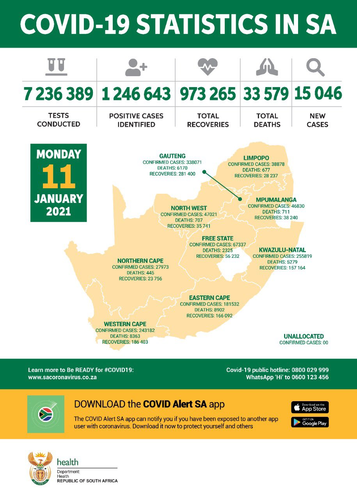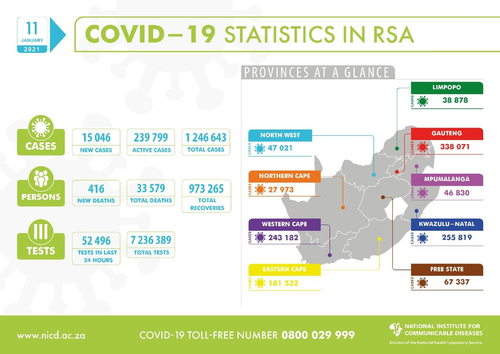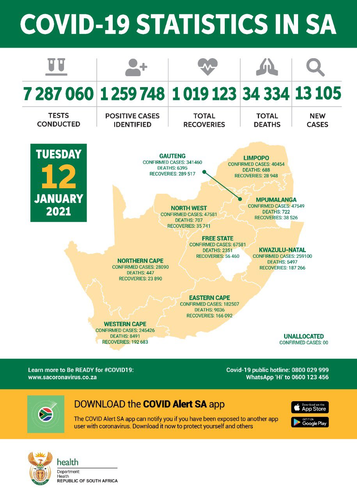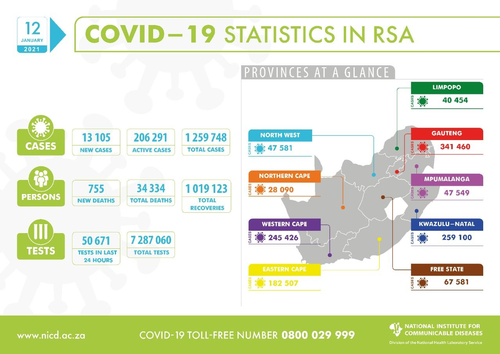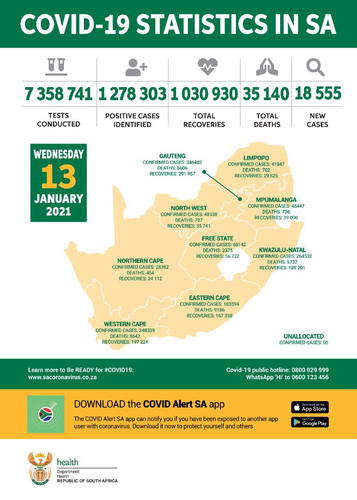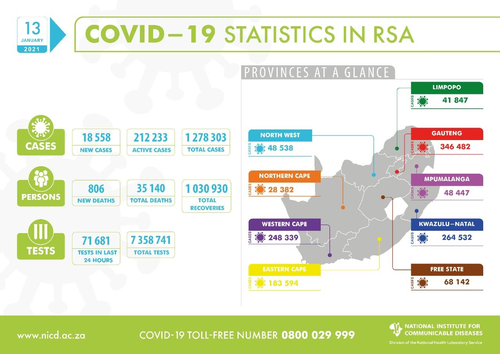OK everyone ... Hold thumbs and say a prayer ... I have a horrid suspicion that they're going to impose some more draconian rulesRamaphosa to address the nation at 20:00 on lockdown measures
https://www.news24.com/news24/south...vid-19-in-south-africa-and-the-world-20200312
Navigation
Install the app
How to install the app on iOS
Follow along with the video below to see how to install our site as a web app on your home screen.

Note: this_feature_currently_requires_accessing_site_using_safari
More options
You are using an out of date browser. It may not display this or other websites correctly.
You should upgrade or use an alternative browser.
You should upgrade or use an alternative browser.
Lockdown diaries - COVID-19 matters!
- Thread starter Grand Guru
- Start date
-
- Tags
- lockdown
OK everyone ... Hold thumbs and say a prayer ... I have a horrid suspicion that they're going to impose some more draconian ruleswhich I guess are unfortunately necessary to bring the Covidiots into line.
I also don't think it's going to be a good one. Numbers have been increasing and we haven't even started with the festive surge as yet.
Yip. Also have that feeling. I think the schools are also going to be closed for a while. It's so sad as my Son is excited about his first day of grade 1. But most of all safety of my family comes way before anything else.I also don't think it's going to be a good one. Numbers have been increasing and we haven't even started with the festive surge as yet.
Sent from my vivo 2006 using Tapatalk
Police bravery never cease to amaze me.
Police bravery never cease to amaze me.
Uncool!
Seriously uncool.Police bravery never cease to amaze me.
Sent from my vivo 2006 using Tapatalk
Bit disappointed actually. Now was the time for more decisiveness and strict enforcement. To at least slow down the current chaos. But they have done so much unnecessary economic damage previously and has misspent so much funds, that they cannot afford to take the NEEDED action now, for fear of economic ruin.
Taking into consideration the fact that our most populated provinces have peaked or nearly peaked, I think it’s not going to be of big benefit for the country and the damage will outweigh the benefitBit disappointed actually. Now was the time for more decisiveness and strict enforcement. To at least slow down the current chaos. But they have done so much unnecessary economic damage previously and has misspent so much funds, that they cannot afford to take the NEEDED action now, for fear of economic ruin.
The verdict on Ivermectin
https://sacoronavirus.co.za/2021/01/11/mac-advisory-ivermectin-for-the-treatment-of-covid-19/
https://sacoronavirus.co.za/2021/01/11/mac-advisory-ivermectin-for-the-treatment-of-covid-19/
Government’s plan to force everyone with a smartphone to pay a TV licence
https://mybroadband.co.za/news/broa...o-pay-a-tv-licence.html?utm_source=newsletter

https://mybroadband.co.za/news/broa...o-pay-a-tv-licence.html?utm_source=newsletter
''These changes are summarised below:
He added that the NCCC would determine a plan for the return of learners to schools in the coming days.''
https://mybroadband.co.za/news/gove...wn-in-south-africa.html?utm_source=newsletter
- National curfew will now be in place from 21:00 until 05:00 every day.
- Ban on alcohol sales will remain in place.
- Funerals will be limited to 50 people and will require compliance with social distancing and other health guidelines.
- Land ports will be closed for entry, with certain exceptions.
He added that the NCCC would determine a plan for the return of learners to schools in the coming days.''
https://mybroadband.co.za/news/gove...wn-in-south-africa.html?utm_source=newsletter
Government’s plan to force everyone with a smartphone to pay a TV licence
https://mybroadband.co.za/news/broa...o-pay-a-tv-licence.html?utm_source=newsletter

I want to see them try enforce this. Besides my phone is not smart, I make the calls, I tell it who to send messages to and I take the photos on it.
We now have a legal definition for ‘beach’ and you can’t go near sand – but water is okay
https://www.businessinsider.co.za/s...well-away-from-anything-resembling-one-2021-1
12 Jan 2021
South Africa's newly updated Alert Level 3 rules have a strict definition of what constitutes a "beach".
'beach' means the sandy, pebbly or rocky shore–(a) between the high-water mark and low-water mark adjacent to–(i) the sea; or(ii) an estuary mouth extending 1000 meters [sic] inland from the mouth; and(b) within 100 metres of the high-water mark, excluding private property, including the sea and estuary themselves adjacent to the beach.
For "estuary", the disaster regulations refer to the National Environmental Management: Integrated Coastal Management Act, which contains this definition:
'estuary' means a body of surface water–
(a) that is part of a water course that is permanently or periodically open to the sea b) in which a rise and fall of the water level as a result of the tides is measurable at spring tides when the water course is open to the sea; or(c) in respect of which the salinity is measurably higher as a result of the influence of the sea
b) in which a rise and fall of the water level as a result of the tides is measurable at spring tides when the water course is open to the sea; or(c) in respect of which the salinity is measurably higher as a result of the influence of the sea
The combined effect of the definitions is that the ban extends to sand, rocks, and pebbles, but not any man-made surfaces such as piers or walkways.
Though the ban reaches up to 100 metres beyond the high-water mark, that excludes private property, so privately-owned picnic spots along rivers close to the ocean are not affected. That is in line with other exceptions, such as for botanical gardens, which broadly allow the use of places that have access control and so can be held responsible for limiting the number of people and for enforcing social-distancing rules.
The definition also implies that the use of the ocean itself, for swimming or other use, is allowed – as long as you don't cross the beach to get to it."
https://www.businessinsider.co.za/s...well-away-from-anything-resembling-one-2021-1
12 Jan 2021
South Africa's newly updated Alert Level 3 rules have a strict definition of what constitutes a "beach".
- Unless you are on private property, you can't set foot on sand (or rocks or pebbles) within a hundred metres of the high-tide mark.
- For river mouths, the "beach" can extend up to a kilometre inland.
- You can probably swim in the ocean – if you can get there.
'beach' means the sandy, pebbly or rocky shore–(a) between the high-water mark and low-water mark adjacent to–(i) the sea; or(ii) an estuary mouth extending 1000 meters [sic] inland from the mouth; and(b) within 100 metres of the high-water mark, excluding private property, including the sea and estuary themselves adjacent to the beach.
For "estuary", the disaster regulations refer to the National Environmental Management: Integrated Coastal Management Act, which contains this definition:
'estuary' means a body of surface water–
(a) that is part of a water course that is permanently or periodically open to the sea
The combined effect of the definitions is that the ban extends to sand, rocks, and pebbles, but not any man-made surfaces such as piers or walkways.
Though the ban reaches up to 100 metres beyond the high-water mark, that excludes private property, so privately-owned picnic spots along rivers close to the ocean are not affected. That is in line with other exceptions, such as for botanical gardens, which broadly allow the use of places that have access control and so can be held responsible for limiting the number of people and for enforcing social-distancing rules.
The definition also implies that the use of the ocean itself, for swimming or other use, is allowed – as long as you don't cross the beach to get to it."
We now have a legal definition for ‘beach’ and you can’t go near sand – but water is okay
https://www.businessinsider.co.za/s...well-away-from-anything-resembling-one-2021-1
12 Jan 2021
South Africa's newly updated Alert Level 3 rules have a strict definition of what constitutes a "beach".
"The full definition reads:
- Unless you are on private property, you can't set foot on sand (or rocks or pebbles) within a hundred metres of the high-tide mark.
- For river mouths, the "beach" can extend up to a kilometre inland.
- You can probably swim in the ocean – if you can get there.
'beach' means the sandy, pebbly or rocky shore–(a) between the high-water mark and low-water mark adjacent to–(i) the sea; or(ii) an estuary mouth extending 1000 meters [sic] inland from the mouth; and(b) within 100 metres of the high-water mark, excluding private property, including the sea and estuary themselves adjacent to the beach.
For "estuary", the disaster regulations refer to the National Environmental Management: Integrated Coastal Management Act, which contains this definition:
'estuary' means a body of surface water–
(a) that is part of a water course that is permanently or periodically open to the seab) in which a rise and fall of the water level as a result of the tides is measurable at spring tides when the water course is open to the sea; or(c) in respect of which the salinity is measurably higher as a result of the influence of the sea
The combined effect of the definitions is that the ban extends to sand, rocks, and pebbles, but not any man-made surfaces such as piers or walkways.
Though the ban reaches up to 100 metres beyond the high-water mark, that excludes private property, so privately-owned picnic spots along rivers close to the ocean are not affected. That is in line with other exceptions, such as for botanical gardens, which broadly allow the use of places that have access control and so can be held responsible for limiting the number of people and for enforcing social-distancing rules.
The definition also implies that the use of the ocean itself, for swimming or other use, is allowed – as long as you don't cross the beach to get to it."
I think I'm going to start charging people to use my beach ... My North Coast property has been in my family for 5 generations, and the handwritten title deeds refer; "the beach side boundary per maritime ruling shall be 9 yards from the hightide mark"
ID and passport applications suspended in South Africa
https://mybroadband.co.za/news/tren...ed-in-south-africa.html?utm_source=newsletter
https://mybroadband.co.za/news/tren...ed-in-south-africa.html?utm_source=newsletter
Just f y i :
‘Conspiracy theories’ and ethical concerns over COVID vaccine
https://www.mtexpress.com/news/coro...cle_06ce369c-553e-11eb-8ff4-171fecd8a75e.html
‘Conspiracy theories’ and ethical concerns over COVID vaccine
https://www.mtexpress.com/news/coro...cle_06ce369c-553e-11eb-8ff4-171fecd8a75e.html
Similar threads
- Replies
- 1
- Views
- 136
- Replies
- 0
- Views
- 83
- Replies
- 0
- Views
- 106
- Replies
- 2
- Views
- 191




